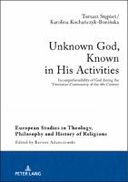Explore

Unknown God, Known in His Activities
0 Ungluers have
Faved this Work
Login to Fave
What can man know about God? This question became one of the main problems during the 4th-century Trinitarian controversy, which is the focus of this book. Especially during the second phase of the conflict, the claims of Anomean Eunomius caused an emphatic response of Orthodox writers, mainly Basil of Caesarea and Gregory of Nyssa. Eunomius formulated two ways of theology to show that we can know both the substance (ousia) and activities (energeiai) of God. The Orthodox Fathers demonstrated that we can know only the external activities of God, while the essence is entirely incomprehensible. Therefore the 4th-century discussion on whether the Father and the Son are of the same substance was the turning point in the development of negative theology and shaping the Christian conception of God.
This book is included in DOAB.
Why read this book? Have your say.
You must be logged in to comment.
Rights Information
Are you the author or publisher of this work? If so, you can claim it as yours by registering as an Unglue.it rights holder.Downloads
This work has been downloaded 149 times via unglue.it ebook links.
- 149 - pdf (CC BY-NC-ND) at OAPEN Library.
Keywords
- Ancient Philosophy
- Ancient religions and mythologies
- Aspects of religion (non-Christian)
- Christian Churches, denominations, groups
- christianity
- Church controversies
- Church history
- God, knowableness
- History of Western philosophy
- Humanities
- Philosophy
- Religion & beliefs
- Religion and beliefs
- Sacred texts
- thema EDItEUR::Q Philosophy and Religion::QD Philosophy::QDH Philosophical traditions and schools of thought::QDHA Ancient Greek and Roman philosophy
- thema EDItEUR::Q Philosophy and Religion::QR Religion and beliefs::QRM Christianity
- thema EDItEUR::Q Philosophy and Religion::QR Religion and beliefs::QRV Aspects of religion::QRVA Sacred texts, scriptures and revered writings
- Theology
- Trinity
- Western philosophy: Ancient, to c 500
Links
DOI: 10.3726/b14190Editions

